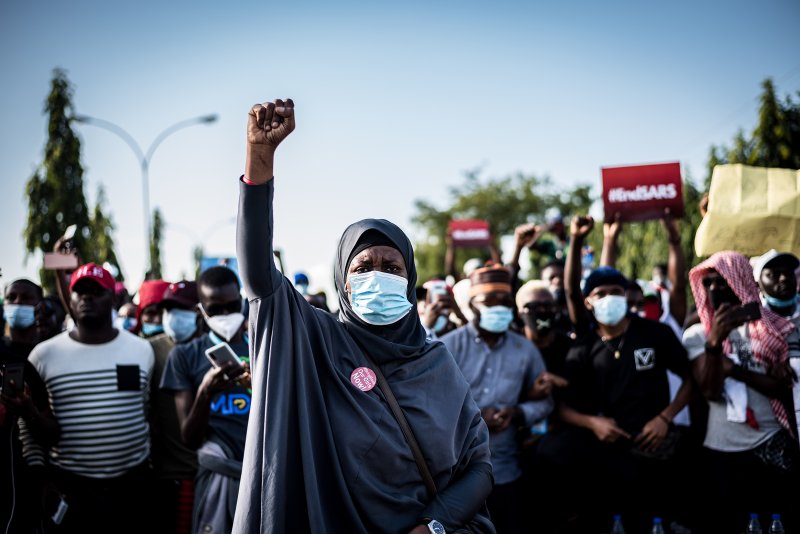In October 2020, Madonna Badom joined the #EndSARS protest in Calabar, Cross River State, with hopes that her voice and that of thousands of youths across Nigeria who had taken to the street to demand the disbandment of the rogue police unit, SARS, would be heard and the government would respond to their pleas.
Two days into the protest, Badom’s parents warned her to stay off the protest grounds, but she refused. She trusted the country and was sure her protest would result in a positive change.
“I had read one too many stories of how SARS tortures young people. What made me especially mad about SARS was when my friend lost so much money to them because of their irresponsible profiling; this was about a year before the #Endsars conversation started. I knew what they were doing, especially in my city, Calabar. I always saw them with the red van, and I heard how boys would warn each other to stay off at a particular road because of them,” Badom said.
Badom said she feared she would be their next victim and saw her involvement in the protest as a means to ensure that never happened.
“I knew it was an infringement of our human rights, and I couldn’t keep quiet. I joined the protest because I knew that if we didn’t ask for change, we would be stuck with their ills and all the atrocities they were causing to our young people.”
Before long, the protest, which started in Ughelli, Delta State, after a video surfaced depicting the police unit’s near-lethal encounter with two young individuals, had swiftly garnered significant traction on social media and expanded its reach throughout Nigeria. This nationwide wave of protest extended to key cities such as Lagos, Abuja, Anambra, Imo, Akwa Ibom, and even as far as Taraba and Kaduna State
A few days into the protest, the police announced the unit’s disbandment, but the protesters demanded more action.
The feared SARS
SARS, which stands for Special Anti-Robbery Squad, was a specialised unit within the Nigerian Police Force. SARS was created in Nigeria to combat violent crimes, particularly armed robbery and kidnapping, and to bring those responsible to justice.
The group’s formation in 1992 marked a historic moment in law enforcement. Before SARS’s establishment, the broader responsibility of tackling anti-robbery efforts rested with the Nigerian Police Force. However, anti-robbery units have operated independently within various states’ criminal investigation departments since 1984.
Various specialised units, which operated under different names at different junctures, were also created to address the surging violent crime following the conclusion of the Nigerian civil. These units included the intelligence response team, special tactical squad, counterterrorism unit, and force intelligence unit.
By the early 1990s, Lagos and southern Nigeria were grappling with the rampant activities of armed robbers and bandits. Police officer Simeon Danladi Midenda, who was in charge of the anti-robbery unit within the criminal investigation department in Benin, southern Nigeria, had made notable strides in combating armed robbery. His accomplishments earned him recognition from the inspector general of police.
In response to the escalating crime rates in Lagos, Midenda was reassigned to the region with a new mandate: to consolidate the three pre-existing anti-robbery squads operating within the former federal capital into a unified force to dismantle the influence of armed criminal groups.
As the newly appointed law enforcement authority in the area and armed with a team of 15 officers and two station wagons, Midenda orchestrated the amalgamation of these units, christening the newly unified entity the Special Anti-Robbery Squad (SARS) in 1992.
But over the years, the group had grown in notoriety and was accused of several human rights infractions. In a report released in 2020, Amnesty International said it had documented 82 cases of torture and extrajudicial execution by the group between 2017 and May 2020.
So when the police hierarchy announced the group’s disbandment, many of the protesting youths insisted that an investigation into the group’s activities be carried out, and officers found guilty should be prosecuted.
The protesters also held that the group had previously been disbanded in 2014, 2015 and 2017 and that there was no difference in this announcement with others.
Then the bullets
Doofan Yaor said she was initially scared of joining the #EndSARS protest in Makurdi, Benue State, but she then remembered what three of her younger siblings had gone through at the hands of the police.
“My younger brother, who was barely 16, was arrested with his mates at JAMB centre, and my sibling, who had gone out to learn to drive with a cousin, was arrested by the police, and the police claimed they stole the car and were driving and shooting when they were arrested,” she said.
Doofan was on Instagram on the evening of 20 October 2020. Like other #EndSARS protesters who had found unity on the hashtag #endsars, she was worried for the protesters in Lagos, who had gathered at the Lekki Toll Gate and had become the rallying point of the protest.

“The Lagos State Government had declared a curfew, and I was praying the protesters could get home on time,” but some didn’t; that evening, men who were later confirmed to be men of the Nigerian Army went to the toll gate and opened fire at the protesters.
What followed in the morning was a series of riots and clashes across the country.
Worse still is the feeling left in the hearts of some of the protesters, “ I don’t know what I feel towards the country. I know I don’t want to leave. I have an emotional attachment to the country, but ENDSARS tested my belief in this country, and I am still processing that emotion,” Yaor said.
Even the panel set up to look into the activities left much to be desired, according to Patrick Obia, a journalist who covered activities of the panel in Cross River State.
Obia held that whatever sincerity was put into the formation of the panel disappeared when the panel started sitting with complaints from members that they were running the panel from their pockets.
As of December 2021, more than a year after the #EndSARS protest, only four states- Ekiti, Ondo, Lagos and Bayelsa- had concluded their sitting, with their findings publicly available.
For Badom, the protest “showed us as Nigerians that we can come together, despite our huge cultural differences, to ask for something. One of our biggest issues as a country is finding unity in our diversity. Hence, seeing youths from all these different states in one voice was phenomenal,” she said, adding that the protest “was the pinnacle of our Nigerianness.”
But today, Badom said, is a reminder of what Nigeria has taken away from young people. “We gave our all, and even some gave up their lives. I am disappointed with the fact that we don’t see progress till now.”





